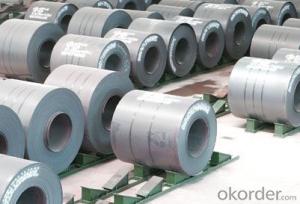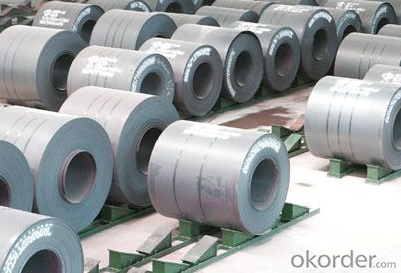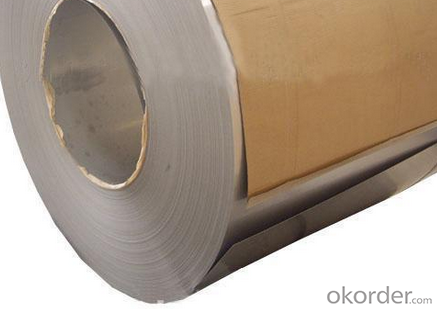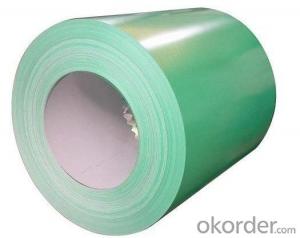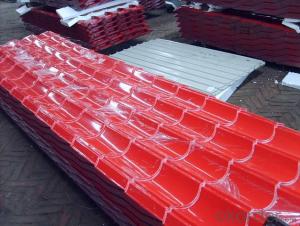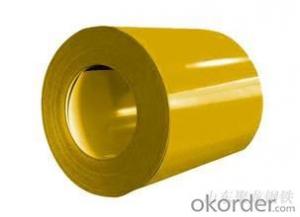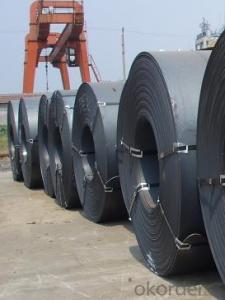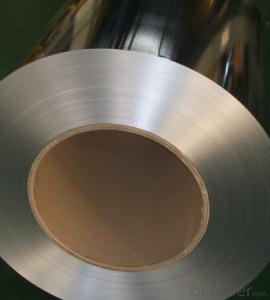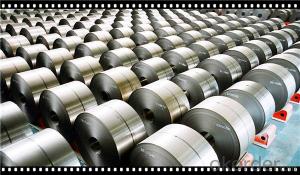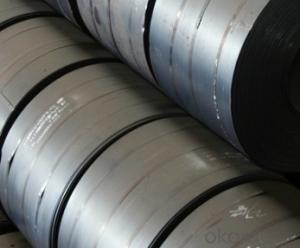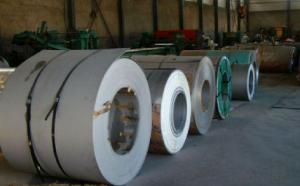Hot Dipped Galvanized Steel Coils CNBM
- Loading Port:
- Guangzhou
- Payment Terms:
- TT OR LC
- Min Order Qty:
- 20 m.t.
- Supply Capability:
- 3000 m.t./month
OKorder Service Pledge
OKorder Financial Service
You Might Also Like
1.Quick Details:
hot dipped galvanized steel coil
Material: | SGCC, DX51D+Z |
Thickness: | 0.13-0.8mm |
Width: | 750-1250mm |
Zinc coated: | 40-180g/m2 |
Standard: | ASTM,AISI,DIN,GB |
Spangle: | Zero Spangle, Regular Spangle, Small Spangle |
Surface treatment: | chromated and oiled, chromated and non-oiled |
Technique: | cold rolled galvanized |
Grade: | Prime |
ID: | 508mm or 610mm |
Coild weight: | 3-5MT/Coil or as your request |
Quality: | Softy , half hard and hard quality |
2.Packaging & Delivery
Packaging Details:Fully seaworthy export packing. Each coil is wrapped in water-proof paper.Fixed with steel strips.
Delivery Detail:about 12 days
3.Festure:
Certificate: | ISO9001, BV test |
MOQ: | 20MT |
Supply Ability: | 3000MT/month |
OEM: | Accept |
Price Item: | FOB, CFR, CIF |
4.Specification:
Standard | EN 10327 | DX51D+AZ, DX52D+AZ, DX53D+AZ, |
EN 10326 | SS250GD+AZ, SS350GD+AZ | |
JIS G3321 | SGLCC, SGLCD, SGLCDD, SGLC 400 | |
ASTM A792M | CS type C, CS type B, DS, SS255, SS345 | |
Base Metal | Cold rolled steel coils SPCC, SPCD, SPCE, DC01, DC03, DC04, CS, DS, DDS, Q195, Q250, Q350 | |
Thickness | 0.22mm-2.0mm | |
Width | 700mm-1300mm | |
Coil ID | 508mm, 610mm | |
Zinc coating | 60g/m2-180g/m2 | |
Surface treating | chromium free passivation, chromium passivation, fingerprint resistant, oiled | |
Spangle types | regular spangle | |
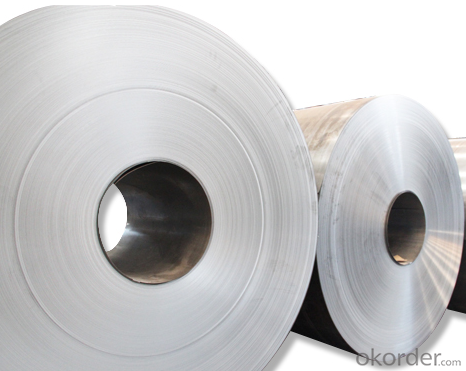
5.What is the application of Steel Coil?
There are two sides,one is out side: Workshop, agricultural warehouse, residential precast unit, corrugated roof, roller shutter door, rainwater drainage pipe, retailer booth;the other is inside: Door, doorcase, light steel roof structure, folding screen, elevator, stairway, vent gutter.
- Q: What are the common coil loading and unloading procedures?
- The common coil loading and unloading procedures typically involve the use of specialized equipment such as cranes or forklifts to safely lift and transport the coils. The procedure may vary depending on factors such as the size and weight of the coils, as well as the specific requirements of the industry. Generally, the coils are loaded or unloaded by carefully positioning them onto or off of a designated storage area or transportation vehicle. The process often includes securing the coils with straps or clamps to prevent any movement or damage during transportation. Proper handling and adherence to safety protocols are crucial to ensure the successful loading and unloading of coils.
- Q: How are steel coils coated for specific applications?
- Steel coils are coated for specific applications using a process called coil coating. In this process, the steel coils are cleaned, treated, and then coated with a layer of paint or other protective material. The coating is applied evenly and precisely to ensure optimal performance and durability in the intended application.
- Q: What is stainless steel coil used for?
- Stainless steel coil is commonly used in various industries for manufacturing a wide range of products such as appliances, automotive parts, cookware, construction materials, and even surgical instruments. Its corrosion-resistant properties and durability make it an ideal material for these applications.
- Q: What are the common applications of steel coils in construction?
- Steel coils are commonly used in construction for various applications such as roofing, siding, structural framework, and reinforcement in concrete structures.
- Q: What are the main factors that affect the paint adhesion on steel coils?
- The main factors that affect paint adhesion on steel coils include surface preparation, cleanliness, and the presence of contaminants such as oil, grease, or rust. Other factors include the quality of the paint itself, the application method, and the curing process. Additionally, the type of steel and its surface condition can also influence paint adhesion.
- Q: I'm trying to put together a small structure using galvanized steel electrical conduit (3/4) and I can't seem to find a T-junction conduit coupler anywhere. I'm wondering if I could weld the tubing together, but I'm not sure if I can weld galvanized steel. Also, if I can weld them, is there any special technique that I need to use outside of regular acetelene/oxygen torch and solder?
- Conduit is made from low carbon steel. Then the galvanized coating is applied. The fumes from the coating are poisonous when heated. So your choices are to remove the coating then do your heating. They can be soldered, brazed and welded. It all depends how strong you want the joint and how high a temperature used. If you use silver solder the joint must be very tight. If you use lead solder a flux must be used same as brazing. Welding is the strongest and the melting temperature of steel is about 2600 degrees.
- Q: This needs to be in a percentage by mass. Could you please also reference where this info has come from. Thanks.
- Steel is almost all elemental Iron (Fe) with a small percentage of carbon (about 0.2 percent) and other alloying metals if required. Iron as in cast iron just has more carbon which lowers the melting point to where it can be cast with lower technology (it was discovered first). Bessemer developed a process to remove most of the carbon and increase the furnace heat, resulting in a tougher metal called steel.
- Q: is red steel any good??????? not sure im really impressed but im not really into fighting games but it looks cool.... so whats your views guys???????anyone bored of smooth moves yet?anyone think the new sonic is bit cra ppy !!!!!!!!!!! darn them any new goooood games coming oput on the wii??
- Trauma center is awesome. Red steel isn't bad. Same as any other FPS except with a pointer... It's no half life, but its not terrible. Multiplayer is highly entertaining though. Especially if you can get four people playing mystery mode. Trust me, its worth the effort of getting them together. Like the other guy said, rent it. I wouldn't buy it.
- Q: Does steel have a valence number and if so, what is it?
- Steel is a mixture, so it doesn't have any valence number. On the other hand, all of the components of the steel mixture are in their elemental forms, so all the various valences are zero.
- Q: How do steel coil manufacturers minimize waste and maximize efficiency?
- Steel coil manufacturers minimize waste and maximize efficiency by implementing various strategies such as optimizing production processes, recycling and reusing scrap materials, adopting advanced technologies for energy conservation, and implementing lean manufacturing principles to eliminate unnecessary steps and reduce downtime. They also focus on continuous improvement, employee training, and regular maintenance of equipment to ensure smooth operations and minimize waste generation.
Send your message to us
Hot Dipped Galvanized Steel Coils CNBM
- Loading Port:
- Guangzhou
- Payment Terms:
- TT OR LC
- Min Order Qty:
- 20 m.t.
- Supply Capability:
- 3000 m.t./month
OKorder Service Pledge
OKorder Financial Service
Similar products
Hot products
Hot Searches
Related keywords
